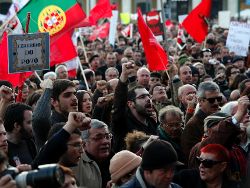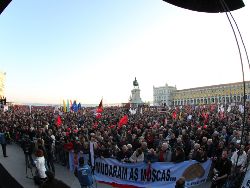 |
| WHO IS THAT GUY ON THE FLAG? |
You have heard by now all about this last weekend in Greece where the lid is coming off. I had intended to do an article on this right here, right now. However, I figured lets just look around a minute.
Portugal is what I found
As the Empire's money men from the IMF head into that country to view what they have accomplished with their "austerity" (are you tired of that word yet) plan, the largest protests in three decades erupted to meet them. Hundreds of thousands of people representing the Portuguese section of the world wide multitude packed Lisbon's Palace Square to protest.
They protest with good cause. since the IMF's plan was instituted the unemployment, the official unemplpyment rate has jumped to record levels and pushed Portugal into it's worst recession in nearly forty yearts. The IMF plan includes cuts of 13 to 14 percent to civil servants wages and pensions.
Good job, Money Men.
Armenio Carlos, the leader of the Confederation fo Portuguese Workers, said:
“We are here to protest against exploitation, inequality and poverty...
The bailout is good for the creditors, who get billions in interest and commissions, good for the banks...but the measures are really bad for the workers, youth, pensioners, for 2.7 million Portuguese on the verge of poverty and those already below the poverty line."
According to Xinhua, one protestor, Sandra Raimundo, said, "I am not willing to pay for the debt that the government made. I have been unemployed for three months at this moment, and I have to take care of my son."
EU financial leaders had been thinking things were swell in Portugal and there would be no repeat of Greece. Seems maybe they are wrong.
The following is from In Defense of Marxism.
PORTUGAL: MASSIVE DEMONSTRATION AGAINST CUTS AND AUSTERITY
February 11 saw 300,000 people march in the Portuguese capital Lisbon against the reform of the labour law and the austerity measures proposed by the government as part of the bailout agreed with the troika. The CGTP trade union, which organised the demonstration under the slogan of “no to exploitation, inequality and impoverishment”, described it as the largest in 30 years.
 Mass demonstration against austerity - Photo: CGTP INTERSINDICALThe demonstration had four rallying points and converged in the huge Palace Square, which was renamed the “People’s Square”. (See Pictures here and at the end of this article)
Mass demonstration against austerity - Photo: CGTP INTERSINDICALThe demonstration had four rallying points and converged in the huge Palace Square, which was renamed the “People’s Square”. (See Pictures here and at the end of this article)
Since it was elected in June, the right-wing coalition government of Passos Coelho has faithfully implemented the demands of the troika as part of the bailout of the Portuguese economy. Coelho has even boasted that in cutting the deficit and addressing the economy’s “structural problems” he is going further than what is actually being demanded in the terms of the Memorandum of Understanding.
These are massive attacks on the living standards of the Portuguese workers and people, through increased taxes, cuts in wages and pensions, privatisation of public companies, payment for healthcare, increased fares in public transport, higher tuition fees, increased hours of work, attacks on collective bargaining rights, etc.
As was to be expected, these measures have contributed to worsening the economic crisis. Portugal’s GDP contracted by 1.6% in 2011, and is expected by the Bank of Portugal to suffer an “unprecedented economic contraction” of 3.1% in 2012 and a further 0.3% fall in 2013. These sacrifices which are demanded of the Portuguese people are not even achieving their stated aim of reducing public debt which is forecast to grow to 116% of GDP in 2012 (from 107% in 2011). To this you have to add 94% household debt and 130% corporate debt, both figures unchanged since 2009.
No-one really believes that Portugal will be able to return to the markets for further funding in 2013 as was the initial aim of the bailout. Portuguese bonds were trading in the secondary market at an interest rate of 17% after Standard and Poor’s downgraded them to junk bond status in January.
These economic figures are what dominated the mood at the trade union demonstration on Saturday. The experience of Greece is very much in the minds of millions of Portuguese today: the Greek workers and people have been forced to take massive cuts in living standards and still nothing has been resolved. Why should the Portuguese go through the same experience?
 Photo: CGTP INTERSINDICALLike in Greece, to the futility of it all you have to add the realisation that the country is no longer ruled by its elected representatives, but by unelected faceless forces in Brussels, Frankfurt and Washington. The troika representatives regularly visit Portugal to oversee progress in the implementation of the measures, like colonial governors in the past. European bureaucrats whisper in the ears of Portuguese ministers: “you are being good, bleeding your country dry, unlike the naughty Greeks, and as a reward you might get some relief in the terms of the bail out”.
Photo: CGTP INTERSINDICALLike in Greece, to the futility of it all you have to add the realisation that the country is no longer ruled by its elected representatives, but by unelected faceless forces in Brussels, Frankfurt and Washington. The troika representatives regularly visit Portugal to oversee progress in the implementation of the measures, like colonial governors in the past. European bureaucrats whisper in the ears of Portuguese ministers: “you are being good, bleeding your country dry, unlike the naughty Greeks, and as a reward you might get some relief in the terms of the bail out”.
Not only this, but the institutions of the troika (IMF, ECB, EU) will also be paid 30 billion euro in interest and commissions on top of the 78 billion euro bailout (of which 12 billion are going directly to bail out private banks).
The Portuguese government is also being praised by the troika for its speed in delivering the programme of privatisation of state-owned companies, having sold off the electricity grid and power generating companies to Chinese state investors.
The latest package of measures, related above all to the reform of the labour law, which is going to be presented to parliament in the next few days, has been agreed with the bosses’ organisations but also with the leaders of the UGT trade union, which have thus broken the unity of action with the CGTP. The so-called “Social Partnership Agreement” includes the following measures:
•Reduction of holiday entitlement from 25 to 22 days a year.
•Reduction in the number of public holidays from 13 to 9 (significantly Independence day and Republic day are axed!).
•Reduction in lay off compensation from 30 days per year worked to 20 days.
•Flexibilisation of working hours – 150 hours a year will be decided by the employer, lengthening the working day in busy periods, shortening it in others.
•Unemployed workers who accept work that pays less than their unemployment benefit are to keep 50 per cent of that benefit (thus saving the employer a lot of money).
•50% reduction in overtime payment and in the payment of the 2 annual bonus payments.
•Increasing the cases in which workers can be sacked legally.
•Reduction in unemployment benefit, both in relation to the amount of money received and the length of time for which it will be received.
•Weakening of national collective bargaining in favour of company agreements (where workers are in a weaker position).
The UGT leaders justified their signing up to these measures with the “lesser evil” argument, saying that the conditions demanded by the troika in the Memorandum were even worse and that through negotiations they had managed to somehow soften the blow. This argument, similar to the one used by the leaders of UGT and CCOO trade unions in Spain to sign a wage restraint agreement which also weakens national collective bargaining, does not have any merit to it. Once you agree to the principle that workers must accept attacks in their rights and conditions (and these are serious attacks), then, inevitably the capitalists will demand more and more attacks, while the union organisations will have been discredited in front of their own members and will be in a much worse position to organise any resistance.
The truth is that, looking at the hard economic facts, the troika will demand even harsher cuts from the Portuguese government in order to comply with the deficit reduction targets in the face of deeper economic recession. The agreement that the UGT leaders have signed will not mean the end but the beginning of sustained attacks on workers’ rights and conditions which are “necessary” from the point of view of “restoring Portugal’s competitivity.”
A skilful non-sectarian policy on the part of the leadership and the activists of the CGTP would now put the leaders of the UGT under a lot of pressure. It is vital to build on the unity of action achieved in the last two general strikes (the most recent one in November 2011 http://www.marxist.com/powerful-november-general-strike-portugal.htm) at factory and workplace level. The aim should be to put the UGT leaders under enormous pressure from below so that they break the agreement they have signed and return to the path of mobilization or else, that workplace, regional and industry-wide structures and rank and file activists of the union disown the policies of their own leaders and join the CGTP in protest actions.
A genuine socialist alternative required
More than 6 months after the election of the right-wing government, opinion polls only register a very slight shift to the left. The two coalition partners, PSD and CDS/PP, have lost about 3% (from 50.3% to 46.7%), while the former ruling social-democratic PS has increased from 28 to 30%, having mildly criticized some of the measures, which at the end of the day are fundamentally the same ones contained in the Memorandum they signed while in office. To the left of the Socialist Party, the Communist Party increases from 7.9% to 8.5% and the Bloco de Esquerda from 5.1% to 6.5%.
These two parties present a comprehensive criticism of the measures proposed and have now started to adopt a language which includes more references to capitalism and with socialism as the alternative. However, the leaders of these two formations are not offering a serious alternative to the consequences of the crisis of capitalism in Portugal.
Instead of saying clearly that the debt should be repudiated, both the PCP and the BE talk of “renegotiating the debt,” while the BE leaders insist on an audit of the debt with the aim of determining which parts of it are “illegitimate” and which should therefore be repudiated. This is a false argument. If you accept the debt has to be renegotiated, you are saying that it should be paid, but perhaps not all of it, not so fast, etc. For the investors to accept such a deal, you will have to show that you are serious about lowering the deficit and the debt… by making massive cuts! This is exactly what is already happening in Greece. The latest austerity package which the Greek people are resisting in the streets is the result of the renegotiation of the debt with the private investors!
The main difference between the BE and the PCP seems to be that while the leaders of the former have the illusion that Europe should be saved and given a “social” character (http://www.esquerda.net/sites/default/files/resolmesa4fev2012.pdf), the Communist Party leaders erect themselves as the defenders of “national production” and “the struggle against imports” (http://pcp.pt/contra_exploracao_aumento_horario/lutar-por-um-portugal-com-futuro).
This is a false choice. There is no such thing as a “social Europe”. The European Union under capitalism means permanent austerity policies and the rule of capitalists and bankers, dominated by those of the countries with a stronger capitalist class.
On the other hand, the idea of defending national production through protectionist barriers means pitching Portuguese workers against the workers of other countries while leaving the profits of the capitalists untouched. Hardly a Communist policy! A “sovereign” capitalist Portugal implementing protectionist policies is also a reactionary utopia. It is precisely the weakness of Portuguese capitalism that has made the economic crisis worse. How could Portuguese products compete in a world market riddled with protectionist counter-measures from its trading partners? Only by attacking workers rights and conditions.
The real alternative is to first of all recognize that these measures are the direct consequence of the crisis of capitalism and the attempt of the ruling class to solve it by making workers pay. Therefore, the only realistic solution is a decisive break with the capitalist system, through the collective ownership and democratic planning of the economy in the interests of the majority of the population. The alternative is socialism. Such an alternative cannot be conceived within the limits of one nation state and even less within the borders of an economically weak country like Portugal. It needs to be linked to the struggle for the Socialist United States of Europe.
On the other hand, neither the trade union leaders nor the leaders of these two parties offer a clear plan of struggle to defeat these austerity measures. The BE correctly talks of a sustained plan of mobilization and the need for the widest possible unity of action against these measures, but then makes no concrete proposals other than some “days of action” in late April. The CGTP statement adopted at the demonstration, again, correctly talks of the need for unity in action and to enlarge the mobilization, but gives no concrete lead, other than calling on all to participate in yet another demonstration on February 29th coinciding with the day of action called by the European TUC.
The mass demonstration on February 11 was a very positive step, but it also came after the November 24 general strike which in itself did not force the government to retreat. In Greece there have been now over 17 separate 24 and 48 hour general strikes and the ruling class still continues to impose austerity packages.
Conclusions need to be drawn from this. What is required is, on the industrial plane, a plan of increasing and sustained action to defeat these measures. That should start with a 24-hour general strike, and then needs to be escalated towards a 48h, a 72h and then an indefinite general strike if necessary. These strikes should be built through democratic strike committees at all levels (company, local, regional and national), so that the workers themselves are fully involved in deciding the plan of action and organizing the movement.
On the political front, the PCP and the BE should offer a united front on the basis of a clear socialist programme, including the repudiation of the debt and the nationalization of the banks and main companies under democratic workers' control. This should be combined with an internationalist approach of linking the struggle of the Portuguese workers with that of the workers in the rest of Europe and the world.
In our opinion, there is no other “realistic” solution to the problems facing the Portuguese workers and youth. In the course of the bitter struggles and experiences of the next few months and years, wider layers of the workers' movement will draw the conclusion that it is the capitalism system that is the problem. What is required is the building of a Marxist revolutionary tendency with roots in the working class organizations able to offer a clear and general alternative that connects with this instinctive conclusions of the masses and gives these a concrete expression.
No comments:
Post a Comment